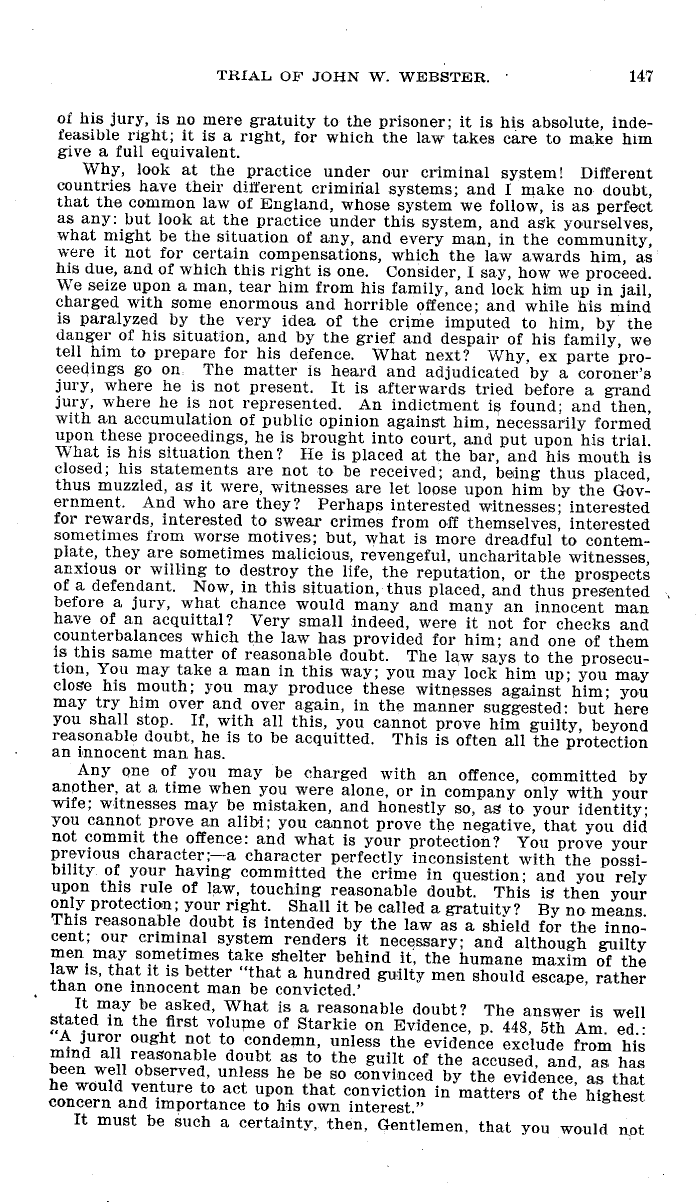|
TRIAL OF JOHN W. WEBSTER. ' 147
of his jury, is no mere gratuity to the prisoner; it is his absolute, inde-
feasible right; it is a right, for which the law takes care to make him
give a full equivalent.
Why, look at the practice under our criminal system! Different
countries have their different criminal systems; and I make no doubt,
that the common law of England, whose system we follow, is as perfect
as any: but look at the practice under this system, and ask yourselves,
what might be the situation of any, and every man, in the community,
were it not for certain compensations, which the law awards him, as
his due, and of which this right is one. Consider, I say, how we proceed.
We seize upon a man, tear him from his family, and lock him up in jail,
charged with some enormous and horrible offence; and while his mind
is paralyzed by the very idea of the crime imputed to him, by the
danger of his situation, and by the grief and despair of his family, we
tell him to prepare for his defence. What next? Why, ex pane pro-
ceedings go on The matter is heard and adjudicated by a coroner's
jury, where he is not present. It is afterwards tried before a grand
jury, where he is not represented. An indictment is found; and then,
with an accumulation of public opinion against him, necessarily formed
upon these proceedings, he is brought into court, and put upon his trial.
What is his situation then? He is placed at the bar, and his mouth is
closed; his statements are not to be received; and, being thus placed,
thus muzzled, as it were, witnesses are let loose upon him by the Gov-
ernment. And who are they? Perhaps interested witnesses; interested
for rewards interested to swear crimes from off themselves, interested
sometimes from worse motives; but, what is more dreadful to contem-
plate, they are sometimes malicious, revengeful, uncharitable witnesses,
anxious or willing to destroy the life, the reputation, or the prospects
of a defendant. Now, in this situation, thus placed, and thus presented
before a jury, what chance would many and many an innocent man
have of an acquittal? Very small indeed, were it not for checks and
counterbalances which the law has provided for him; and one of them
is this same matter of reasonable doubt. The law says to the prosecu-
tion, You may take a man in this way; you may lock him up; you may
close his mouth; you may produce these witnesses against him; you
may try him over and over again, in the manner suggested: but here
you shall stop. If, with all this, you cannot prove him guilty, beyond
reasonable doubt, he is to be acquitted. This is often all the protection
an innocent man has.
Any one of you may be charged with an offence, committed by
another, at a time when you were alone, or in company only with your
wife; witnesses may be mistaken, and honestly so, as to your identity;
you cannot prove an alibi; you cannot prove the negative, that you did
not commit the offence: and what is your protection? You prove your
previous character; -a character perfectly inconsistent with the possi-
bility of your having committed the crime in question; and you rely
upon this rule of law, touching reasonable doubt. This is then your
only protection; your right. Shall it be called a gratuity? By no means.
This reasonable doubt is intended by the law as a shield for the inno-
cent; our criminal system renders it necessary; and although guilty
men may sometimes take shelter behind it, the humane maxim of the
law is, that it is better "that a hundred guilty men should escape, rather
than one innocent man be convicted.'
It may be asked, What is a reasonable doubt? The answer is well
stated in the first volume of Starkie on Evidence, p. 448, 5th Am. ed.:
"A juror ought not to condemn, unless the evidence exclude from his
mind all reasonable doubt as to the guilt of the accused, and, as, has
been well observed, unless he be so convinced by the evidence, as that
he would venture to act upon that conviction in matters of the highest
concern and importance to his own interest."
It must be such a certainty, then, Gentlemen, that you would not
|

